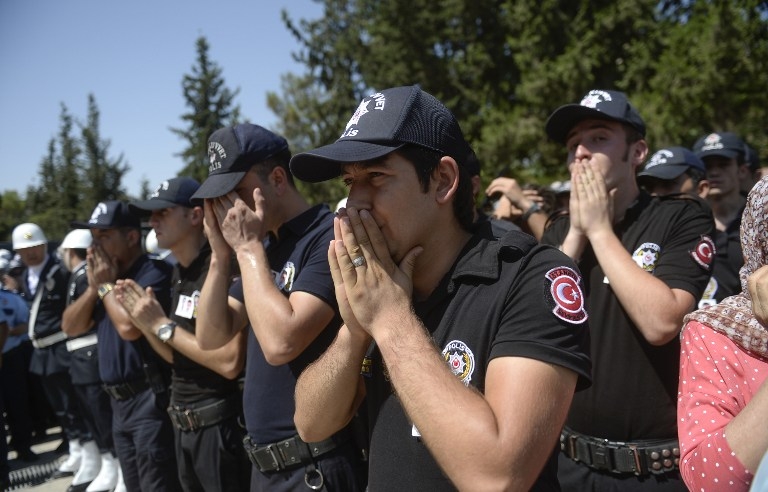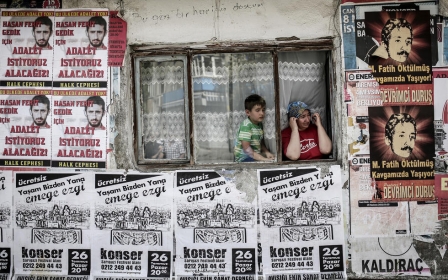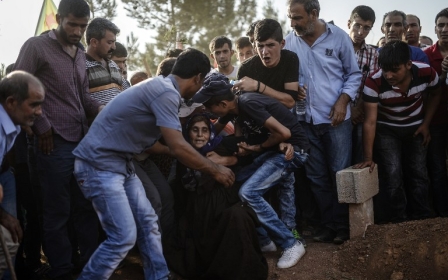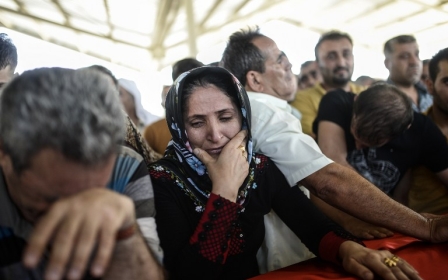Has the Kurdish peace process broken down in Turkey?

Has Turkey’s peace-process with the Kurds, which only six months ago seemed poised for further breakthroughs, finally broken down? And, even more terrifyingly, could the country now become embroiled in a triangular confrontation with both the Kurds and the Islamic State (IS) group?
The ceasefire proclaimed in March 2013 seems to be crumbling fast. On Tuesday, a Turkish soldier was shot dead by the PKK (Kurdistan Workers Party) a few hours after 32 people, mostly young Turkish socialist volunteer workers on their way to Kobane, died in a suicide bombing at Suruc, generally assumed to be the work of IS in its struggle against the Kurdish movement.
The following day, two Turkish policemen, were shot dead in their home near the Syrian border. The PKK promptly claimed responsibility, saying that the killings were in revenge for the Suruc attack which it blames not just on IS, but also on Turkey’s ruling AKP (Justice and Development Party). It also claimed responsibility for the death of a suspected member of IS in Istanbul. On Thursday, masked gunmen reportedly shot at two traffic policemen in Diyarbakir, with one dying later in a hospital. No group took immediate responsible for the shooting.
The accusation that the AKP supports IS is strongly believed by most Kurdish radicals who point towards relative official tolerance of IS over the last year. In fact, the AKP acting government has – many say belatedly – cracked down quite hard on IS inside Turkey over the past few months. Around 51 suspected IS members were detained in raids across the country this month and government sources claim more than 500 such detentions this year.
On Thursday this week, the government, which had previously insisted that cooperation with the US-led coalition against IS must just be one prong alongside moves against the Assad government and Kurdish militants, announced an agreement to cooperate actively with the US against IS. Its precise terms are secret but announcing the deal, Deputy Prime Minister Bulent Arınc did not rule out the possibility that the Incirlik Airbase in Adana would be used, marking a major shift in Turkish policy.
For the Kurds, news of the moves against IS is overshadowed by an apparently non-stop volley of uncompromising denunciations of them from government spokesmen, led by President Erdogan. He claims that Kurdish fighters in Kobane are as dangerous as IS and that the HDP (Peoples Democracy Party), the pro-Kurdish party which is attempting to transform itself into a nationwide Turkish left-of-centre movement, is linked with PKK violence, and even – some suggest - with IS, the group which is actively fighting the PKK. (IS itself for good measure has accused President Erdoğan of support for the PKK.)
The low point to which the dialogue between government and the HDP has sunk was shown not just by unusually fierce language by Erdogan after the killing of the two policemen, but by deputy PM Arinc, who asked publicly why there had been no HDP members of parliament around when the Suruc bomb exploded. The question was remarkably distasteful since one HDP MP lost his wife and son in the blast.
Speaking at their funeral on Wednesday, HDP leader Selahattin Demirtaş by contrast went out of his way to try to relieve tensions, warning that "blood could not be washed away with blood" and praying for the murdered policemen and their families who were also sons of the same fatherland. His attempts to call for calm when Turkey is in uproar are more remarkable since the HDP faced a spate of attacks on its regional offices and election buses during the election, culminating in a bomb attack on its final rally on 5 June in which four people were killed.
Demirtas is caught between two extremes. The operational head of the PKK’s guerrillas, Cemil Bayık, has never liked the ceasefire and frequently spoken of ending it, most recently on 16 July. He believes the deal has brought the Kurds nothing important and the contacts should end until Abdullah Ocalan, the PKK’s leader held in jail since 1999, is released.
Ocalan is being held in isolation on the island prison at Imrali on the sea of Marmara, and though last autumn he successfully halted a wave of riots in eastern Turkey with an appeal to his followers, his views on current events, including the rise of Demirtas, the HDP, and the ceasefire are not known. Demirtas has called for the ceasefire to continue, but he admits that it is not him but Ocalan who has the necessary authority to keep the PKK guns silent.
Erdogan also indicated earlier this month that his confidence in the peace process has waned. He now seems to regard the PKK as a simple terrorist organisation, rejects the terms agreed at the end of 2014, and says the HDP is an extension of the PKK.
Why is there such demonisation of the HDP, perhaps the most likely vehicle to end 30 years of violence in eastern Turkey? One reason may be that the government has precious few concessions to offer the Kurds, and that most of the things they are asking for – the release of Ocalan and introduction of Kurdish schools – might be politically fatal, while anything smacking of federalism or devolution would be even more unacceptable.
Behind this lies awareness that a second general election this year now looks likely. To regain the overall majority it lost in June, the AKP needs both to win back disgruntled conservatives among the ethnic Turks and also to stop the erosion of its votes in eastern Turkey among the non-PKK, often Islamist, Kurds in the south east who seem to have been mainly responsible for the surge in HDP votes in the June election. Ankara is also seriously annoyed that the Peoples Defence Units in the Kurdish-occupied parts of northern Syria have upstaged it as allies of the US against IS, hence the drive to discredit them.
In short, it looks as if the prospect of new elections is creating a desperately acute party-political short-termism, in which long-term considerations are being sacrificed to polemics, the PKK is the easiest stick to beat, and IS can feed off the tensions. Hasan Cemal, a veteran Turkish commentator wrote on Wednesday, “Early elections would be crazy and could mean a blood bath. The sensible way forward is a grand coalition.”
- David Barchard has worked in Turkey as a journalist, consultant, and university teacher. He writes regularly on Turkish society, politics, and history, and is currently finishing a book on the Ottoman Empire in the 19th century.
The views expressed in this article belong to the author and do not necessarily reflect the editorial policy of Middle East Eye.
Photo: Turkish police officers mourn during the funeral of two police officers on 23 July 2015 in Sanliurfa, after they were found shot dead at their home in the Turkish town of Ceylanpinar on the border with Syria (AFP)
New MEE newsletter: Jerusalem Dispatch
Sign up to get the latest insights and analysis on Israel-Palestine, alongside Turkey Unpacked and other MEE newsletters
Middle East Eye delivers independent and unrivalled coverage and analysis of the Middle East, North Africa and beyond. To learn more about republishing this content and the associated fees, please fill out this form. More about MEE can be found here.





